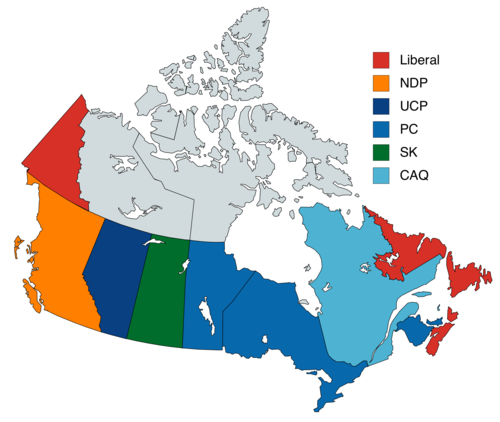Analysis: Poilievre's Loss And Its Impact On The Canadian Political Landscape

Table of Contents
Analyzing the Reasons Behind Poilievre's Loss
Several interconnected factors contributed to Pierre Poilievre's unsuccessful leadership bid. A comprehensive analysis reveals shortcomings in campaign strategy, leadership style, and the influence of external forces.
Conservative Party Messaging and Platform
The Conservative Party's campaign messaging, while successfully mobilizing a dedicated base, arguably failed to connect with a broader swath of the Canadian electorate. Specific policy proposals, often framed around economic freedom and a smaller government footprint, may have alienated some voters.
- Unsuccessful Campaign Strategies: The focus on certain divisive social issues might have alienated moderate voters. The campaign's reliance on online engagement, while effective in reaching a segment of the population, may not have been sufficient to win over undecided voters.
- Voter Demographics: Poilievre's strong appeal to rural and Western Canada was not enough to overcome the Liberal Party's support in urban centers and other regions.
- Key Policy Debates: The Conservative platform's emphasis on deregulation and tax cuts, while popular with some, was perceived by others as potentially detrimental to social programs and environmental protection.
The Impact of Leadership Style
Poilievre's leadership style, characterized by a strong, sometimes confrontational approach, played a crucial role in shaping public perception. While his energy and conviction resonated with his base, it may have alienated potential supporters who found his tone divisive or uncompromising.
- Public Appearances and Media Interactions: His frequent appearances at rallies and his use of strong rhetoric, while effective in galvanizing supporters, may have been perceived negatively by undecided voters.
- Internal Party Dynamics: While he united a large segment of the party, internal divisions and disagreements within the CPC also likely played a role in the overall election outcome.
- Political Image: His public persona, perceived by some as aggressive and uncompromising, may have limited his appeal to a wider range of voters.
The Role of External Factors
Beyond the CPC's internal dynamics, external factors significantly impacted the election results. The state of the economy, prevailing social issues, and international events all played a role.
- Economic Conditions: Despite concerns about inflation and economic uncertainty, the economy was not perceived as being in a crisis, limiting the effectiveness of the Conservative Party's economic message.
- Social Issues: Discussions surrounding issues like abortion rights and climate change likely influenced voter decisions, with some voters prioritizing different social issues over economic concerns.
- Media Influence: Media coverage, both traditional and social media, played a critical role in shaping public perceptions of Poilievre and his campaign. The narrative surrounding the campaign influenced public opinion.
- Public Opinion Polls: Pre-election polls consistently showed a lead for the incumbent government, potentially influencing voter behavior and impacting turnout.
The Long-Term Impact on the Canadian Political Landscape
Poilievre's loss has far-reaching consequences for the Canadian political landscape, influencing the Conservative Party's future, the Liberal government's trajectory, and the broader political system.
Shifting Political Dynamics within the Conservative Party
Poilievre's defeat could trigger internal party divisions and potential leadership challenges. The future direction of the party will hinge on addressing the concerns that contributed to the loss.
- Potential Leadership Candidates: The failure of Poilievre's campaign will likely lead to a reassessment of leadership styles and strategies within the CPC, with other potential leaders emerging.
- Internal Factions: The party might witness increased factionalism as different groups compete for influence and direction.
- Future Policy Directions: The party's policy platform might undergo revisions to broaden its appeal and address the concerns of voters who did not support Poilievre.
- Party Reorganization: A potential restructuring of the party's organizational structure is likely as the CPC works towards rebuilding.
Implications for the Liberal Government
The outcome of the election strengthens the Liberal government's position, allowing them to pursue their legislative agenda with greater confidence. However, they must remain vigilant to address the concerns raised by voters.
- Government Priorities: The Liberals will likely continue to focus on their priorities, including economic recovery, social programs, and climate change initiatives.
- Potential Policy Changes: While strengthened, the Liberals still face pressure to address public concerns and might modify their approach to certain policy areas.
- Political Opposition: While the CPC remains a significant opposition force, their internal challenges might hinder their ability to effectively challenge the Liberal government in the short term.
The Broader Implications for Canadian Politics
The election results demonstrate the complexities of modern Canadian politics, highlighting the role of social media, evolving demographics, and emerging political trends.
- Emerging Political Trends: Poilievre’s campaign reflected certain emerging trends, such as the power of online mobilization and the increasing polarization of political discourse. These trends will continue to shape future elections.
- Voter Behaviour: The election highlighted shifts in voter behavior, emphasizing the need for political parties to adapt to changing demographics and societal values.
- Social Media Influence: The role of social media in shaping political narratives and influencing voter opinions was once again significant.
- Long-Term Political Consequences: Poilievre’s loss and the factors contributing to it will continue to be analyzed and debated, shaping the future of Canadian political strategy and discourse.
Conclusion: Understanding the Aftermath of Poilievre's Loss and its Implications for the Future of Canadian Politics
Pierre Poilievre's loss represents a pivotal moment in Canadian politics. The analysis reveals a complex interplay of internal party factors, leadership style, and external influences that contributed to his defeat. The long-term implications are significant, impacting the Conservative Party's internal dynamics, the Liberal government's stability, and the broader Canadian political landscape. The outcome underscores the need for political parties to adapt to evolving voter expectations and the challenges of navigating a rapidly changing political environment. Further research into Poilievre's defeat and its ripple effects is crucial for understanding the future of Canadian politics. We encourage you to share your thoughts and analysis of Poilievre's loss and its impact on the Canadian political landscape in the comments section below. Let's continue this important discussion regarding the Canadian political landscape analysis and the implications of Poilievre's defeat.

Featured Posts
-
 Fotbolti I Kvoeld Dagskra Og Urslitaspa
Apr 30, 2025
Fotbolti I Kvoeld Dagskra Og Urslitaspa
Apr 30, 2025 -
 Rodons Stellar Pitching Yankees Secure Series Finale Win Against Guardians
Apr 30, 2025
Rodons Stellar Pitching Yankees Secure Series Finale Win Against Guardians
Apr 30, 2025 -
 Becciu Chat Segrete E Accuse Al Vaticano Il Cardinale Parla Di Complotto
Apr 30, 2025
Becciu Chat Segrete E Accuse Al Vaticano Il Cardinale Parla Di Complotto
Apr 30, 2025 -
 Yankees Rodon Delivers Strong Start Securing Victory Over Guardians
Apr 30, 2025
Yankees Rodon Delivers Strong Start Securing Victory Over Guardians
Apr 30, 2025 -
 Michael Jordan A Collection Of Fast Facts
Apr 30, 2025
Michael Jordan A Collection Of Fast Facts
Apr 30, 2025
